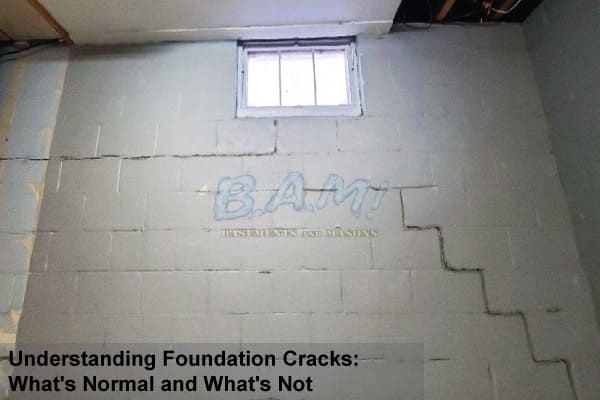When you own a home, it is normal to be concerned about any cracks that appear on your foundation. After all, the foundation is one of the most important parts of your home, and any damage to the foundation can cause serious issues or safety concerns. However, not all foundation cracks are the same, and it can be hard to know what’s normal and what’s cause for concern. In this article, we’ll explore if there is such a thing as a normal home foundation crack.
First, it’s important to understand that some level of settling and movement is very normal in any home. This is because your home’s foundation is constantly subjected to a variety of forces, including changes in temperature and moisture levels, as well as the weight of the structure itself. Over time, this can cause the foundation to shift and settle, leading to cracks.
There are several different types of foundation cracks, each come with their own potential implications for your home’s safety and structural integrity. Let’s take a look at some of the most common types of foundation cracks, and what they might mean for your home.
Vertical foundation cracks
Vertical foundation cracks are one of the most common types of foundation cracks and are in most cases considered to be relatively normal. Vertical cracks tend to appear as straight lines running up and down the foundation and are often caused by minor settling or shrinkage of the concrete. If the crack is less than 1/4 inch wide, it is usually not cause for concern. If you notice a vertical crack that is wider than 1/4 inch, or that is accompanied by other signs of damage (such as bowing or bulging walls), it’s important to get a professional out as soon as possible. A wider crack can be a sign of a more serious problem, such as soil erosion or an issue with the foundation footing.
Horizontal Foundation cracks
Horizontal foundation cracks are less common than vertical foundation cracks but can be more serious. These cracks run parallel to the ground and are often caused by pressure from the soil surrounding the foundation. They can also be caused by excessive moisture, which can cause the soil to expand and put pressure on the foundation, also known as Hydrostatic Pressure. If you notice a horizontal crack, it’s important to get it resolved as soon as possible. These cracks can compromise the structural integrity of your home and may require extensive repairs, or even complete foundation replacement if not addressed immediately.
Diagonal Foundation cracks
Diagonal Foundation cracks are another common type of foundation crack, and can be caused by various factors. These cracks tend to run at a 45-degree angle and can be caused by settling or shifting of the foundation, as well as hydrostatic pressure from the soil. Also like vertical cracks, small diagonal cracks (less than 1/4 inch wide) are usually not anything to worry about. However, if you notice a wider crack, or one that is accompanied by other signs of damage, it’s important to get a professional basement repair company out to assess the damage.
Stair-step Foundation cracks
Stair-step foundation cracks are a type of diagonal crack that often appears near the corners of the foundation. These cracks tend to run in a pattern that resembles a set of stairs, with each crack getting wider as it moves up the foundation. Stair-step cracks are usually a sign of more serious damage to the foundation, such as settling or shifting. If you notice these types of cracks, it’s important to have your foundation inspected by a professional as soon as possible.
What to do if you notice foundation cracks
If you notice basement foundation cracks, it's important to act as soon as possible to prevent the problem from worsening. Here are some steps you can take:
Monitor the crack: If the crack is small (less than 1/4 inch wide), you may be able to simply monitor it over time to see if it changes or grows. Take note of the size and location of the crack and check it periodically to see if it has gotten wider or longer.
Assess the severity: Check the size and shape of the cracks to determine if they are minor or major. Minor cracks, such as hairline cracks, may not be a serious concern, while larger or wider cracks may indicate a structural problem that needs to be addressed immediately.
Consult a professional: Contact a Professional Basement repair contractor to evaluate the situation and provide recommendations on the best course of action. They can assess the severity of the problem and offer the best solutions for you and your home to repair the foundation.
Repair foundation cracks: Depending on the severity of the cracks, repairs may involve filling the cracks with epoxy or polyurethane injection, Installing steel braces for reinforcement, or even excavating and rebuilding the foundation. A professional can provide guidance on the appropriate repair method for your home.
Prevent future damage: To prevent future cracks, it's important to maintain proper drainage around your home, ensure that the soil around the foundation is stable, and avoid placing heavy objects or equipment near the foundation.
Addressing basement foundation cracks early can save you time and money in the long run and ensure the safety and stability of your home.
Leave it the Foundation Repair Professionals
Completing a basement wall crack repair isn’t easy for individuals who have no experience. This is why it’s important to work with professionals. BAM can handle everything from filling in small, minor cracks that won’t cause a lot of damage to major cracks that may require full replacement of all or a portion of the wall. We can help you determine what repair may be needed to ensure your home is as structurally sound as possible.
Give BAM Basements and Masons of Des Moines a call for all your Battery backup and sump pump needs. We are the Premier waterproofing and Egress window company serving the Des Moines, Iowa area. If you’re located in Des Moines, Ankeny, Bondurant, Altoona Pleasant hill, Ames, Adel, Waukee, Indianola, Grimes, Urbandale, Johnston, West Des Moines, Clive or the surrounding areas, we’re the place to call.


